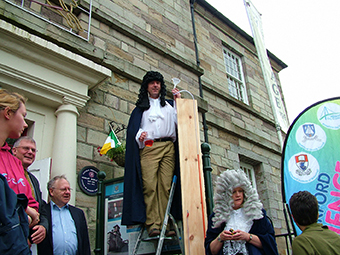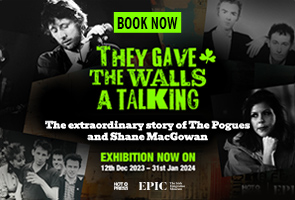Science and Irish history
Published in Issue 5 (September/October 2016), Platform, Volume 24HAS SCIENCE ALSO BEEN AIRBRUSHED OUT OF IRISH HISTORY?
By Eoin Gill

Above: Eoin Gill re-enacting a demonstration of Boyle’s Law—the inverse relationship between pressure and volume in a gas at a constant temperature—at the Robert Boyle Summer School in Lismore, Co. Waterford.
In Ireland we have created a very gratifying national cultural identity as a nation of writers and musicians, and in support many people are able to rattle off names such as Swift, Wilde, Yeats, Joyce, Beckett and so on. The names Boyle, Hamilton, Stokes, Boole, Tyndall, Callan or Parsons are less likely to be produced as evidence of Irish genius. While the man or woman in the street may be able to name famous writers without having read them, he or she is likely to be benefiting from the work of a leading Irish scientist or engineer without knowing it. In the same way as someone is missing something by not having read the great works of Irish writers, one is missing out by not knowing about the works of our scientists.
Science, one of the great human achievements, has had more of an impact on human life and more influence on shaping modern thought and the modern world than those preoccupations of school history, the successions of monarchies or the growing and fading of empires. As Robert Boyle tells us:
‘And those great transactions, which make such a noise in the world, and establish monarchies or ruin empires, reach not so many persons with their influence, as do the theories of physiology.’
(Some considerations touching the usefulness of natural philosophy)
The annual Robert Boyle Summer School was founded to assert the place of science in our culture and to provide a platform where scientists, historians and cultural commentators could come together to explore issues relating to science. The school celebrates Boyle as one of the most important thinkers of the seventeenth century at his birthplace in Lismore, Co. Waterford. From 23 to 26 June 2016 the fifth summer school addressed the theme of science and Irish identity with historians Jane Ohlmeyer and David Attis, cultural commentators Brian Trench and Luke Gibbons, and scientists Jim Malone and Flor McCarthy. The school also hosted a History Ireland Hedge School chaired by editor Tommy Graham.
So why is science not part of our cultural identity and why are our great scientists not celebrated? There are many notions circulating. One suggestion is that Irish science was a Protestant pursuit and so nationalist Ireland airbrushed it out. On the other hand, many of our great writers were Protestant and are celebrated. It is true, however, that many prominent scientists, such as George Stokes (MP for Cambridge), John Tyndall (Royal Institution) and William Thomson (Lord Kelvin), were publicly anti-Home Rule. The Irish Free State drew from the Celtic Revival in creating a new identity. Perhaps science was too closely identified with England?
It has also been suggested that the Catholic Church was suspicious of science as an alternative authority, and even that Catholics were unsuited to science because of an obedient and superstitious nature. We have the counter-example here of Revd Prof. Nicholas Callan, who had the largest electricity supply in the world in an outhouse in Maynooth and who invented the induction coil, which is vital to the operation of the petrol engine. Another factor that should be considered is that until recently we had little industry, so there was not a great requirement for science graduates. We weren’t in the Second World War, in which technology and science played such a crucial role. Neither were we involved in the weapons race and space race, which formed part of the Cold War.
Nevertheless, it can’t be overlooked that there may be prejudice and cultural snobbery at work, with Irish society divided into C.P. Snow’s two worlds of science and humanities. Yet science and history should be close allies: the one exploring the natural world and the other tracing the progress of humanity, and both holding evidence as pre-eminent and both influencing wider society. The Irish history community on the whole has paid little attention to the history of science: there is little research and little teaching in the area. Scientists bemoan the lack of attention yet must reach out and acknowledge the importance of history in understanding science. Irish scientists and funders send out a message arguing the importance of science based on utility and economic necessity but must learn to see and show science as an intellectual and creative exploration. Scientists must also be supportive of funding of history particularly in this area.
It must be acknowledged that there is some significant work ongoing in Ireland and there are many green shoots emerging. An Irish History of Science, Technology and Medicine Network (HSTMNI) has recently been established to progress the discipline area. The Robert Boyle Summer School is now five years old and will continue to grow, but we must find more ways to bring history and science and historians and scientists together.
Eoin Gill is a lecturer at Waterford Institute of Technology and founder of the Robert Boyle Summer School.
Read More:
Robert Boyle
FURTHER READING
M. Hunter, Boyle: between God and science (Yale, 2009).
http://www.robertboyle.ie/.
http://www.bbk.ac.uk/boyle/.
















